By Julia Jones
For our last issue of the RDA Journal 2022 we offer you reading recommendations from a dozen RDA Members and Contributors to The Deben magazine. Initially we just asked for recommendations (which is why the first two are quite brief) but then we began to ask people a little more about their reading habits – what sort of books they regularly enjoyed, did they usually buy or borrow books, did they use the library?
You will notice, however, that our interpretation of “twelve” recommendations is somewhat generous. We put a deadline of the 12th December for people’s suggestions, but there’s no holding back good RDA members. We’d like to thank Robin Whittle, Sue Ryder Richardson and Simon Reed for remaining undaunted on matters of deadline, and sending us their recommendations anyway.
We think this is a lovely choice of books. If you’d like to add more at any point, please send them to Julia ([email protected]) and we’ll add them to our social media, and perhaps the next magazine. If anyone feels they’d like to organise an RDA reading group, I’ll certainly be signing up.
Now read on…
-
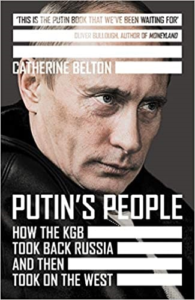 Colin Nicholson, RDA co-chair
Colin Nicholson, RDA co-chair
Recommendation:
Putin’s People by Catherine Belton, sometime FT Moscow correspondent and now banned from Russia (William Collins, 2021)
“Provides insight into the mafia-like kleptocracy that has attacked Ukraine in such a completely unwarranted invasion.” -
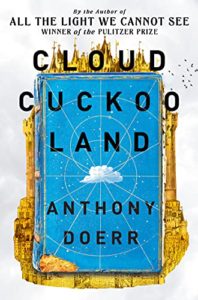 Caroline Matthews, RDA Committee member
Caroline Matthews, RDA Committee member
Do you usually buy books, use the library, chose as part of a reading group?
“I order books at the library, buy new if by favourite authors, buy on Kindle for travelling and belong to a reading group.”
Recommendation:
Cloud Cuckoo Land by Anthony Duerr (4th Estate, 2022)
“This is a celebration of books, libraries and love through the centuries linked to messages about man’s destructive impulses and the dangers of climate change.” -
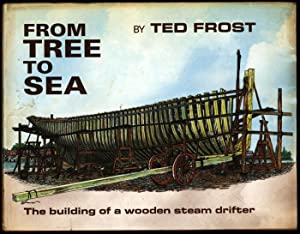 Matt Lis, manager Woodbridge Boatyard and RDA Committee member representing River Businesses
Matt Lis, manager Woodbridge Boatyard and RDA Committee member representing River Businesses
What sort of books do you normally enjoy reading?
“A wide variety of fiction, scientific or historical non-fiction and, in rare cases, a biography.”
Do you usually buy books, use the library, chose as part of a reading group?
“I would normally buy a paper book.”
Recommendation:
From Tree to Sea: The building of a wooden steam drifter, written and illustrated by Ted Frost (Terence Dalton, 1985)
“I bought a good secondhand copy for about £25.”
“From Tree to Sea was recommended to me whilst at a symposium earlier this year in which we were discussing whether the craft of traditional boatbuilding is dying out in the UK and should be moved onto Heritage Craft’s Red List. The book recounts life in a Lowestoft shipbuilding yard around a hundred years ago through the eyes of the author who was apprenticed there at the time. Ted Frost’s remarkable yet humble level of detail, fondness for the men, machines and animals who worked at the yard and beautiful illustrations make the book a joy to read and a testament to the reward that can be won in finding one’s vocation.
As well as being a lovely book in its own right, it is also a poignant reminder of how small an industry traditional boatbuilding is these days by comparison and the value of protecting the skills and knowledge for present and future generations to be able to discover if boatbuilding is their calling too. And, even if the level of boatbuilding detail is a bit much for some, it is worth seeing a copy just for Ted’s beautiful illustrations of a bygone age.” -
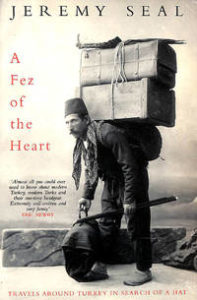 Sarah Zins, Ex Chair of River Deben Association
Sarah Zins, Ex Chair of River Deben Association
What sort of books do you normally enjoy reading?
“I normally enjoy a wide range of fiction, but nothing too scary (Donna Leon is my limit and that only because the food descriptions compensate for the suspense!)”
Do you usually buy books, use the library, chose as part of a reading group?
“My books mostly come from the Woodbridge Library or the marvellous Oxfam bookshop in town, but if I am after something specific I buy it locally. I am not part of a reading group – too structured for my taste!”
Recommendation:
A Fez of the Heart: Travels Around Turkey in Search of a Hat, by Jeremy Seal (Pan Macmillan, 1996)
“In the Spring this year I was lucky enough to go on a trip to the coastal region of northern Turkey and our guide, Jeremy Seal, is also an author, with several books about Turkey under his belt. My chosen book is his first and is called: A Fez of the Heart: Travels Around Turkey in Search of a Hat. The book was shortlisted for the 1995 Thomas Cook Travel Book Award.
The hat on which he hangs the dissemination of his extensive knowledge of the area is his search for a Fez, inspired by finding one in his parents’ attic. It is a winter journey through Turkey, written so wittily and easily that you don’t notice quite how much information has been imparted about an essential part of Turkish history and the still highly pertinent issues of race and language and belonging.” -
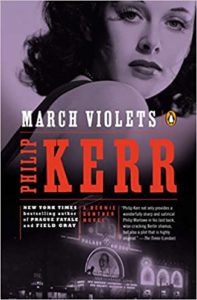 Peter Wain, long standing RDA member, local historian
Peter Wain, long standing RDA member, local historian
What sort of books do you normally enjoy reading?
“I enjoy reading history books, fiction and non fiction, especially about the Medieval period. However I am particularly fascinated by the history of Germany between the wars and thoroughly enjoy Philip Kerr’s Berlin Noir series of historical thrillers set in Germany during the 1930s, the Second World War and the Cold War series which recount the exploits of an ex Berlin policeman turned private investigator, Bernie Gunther.”
Do you usually buy books, use the library, chose as part of a reading group?
“I buy the books because they are good to re-read.”
Recommendation:
March Violets by Philip Kerr (Viking, 1989)
“March Violets is the first of the fourteen books in the Bernie Gunther series. It is set in 1936. Bernie Gunther is employed as a private investigator to recover a diamond necklace stolen in circumstances where the husband, who was an SS officer, and wife owners are murdered.
What is special about this book (and the subsequent books in the same series) is that it is very well written and a compelling story which, although fiction, involves actual historical figures and exact references to places in Berlin and Germany. The themes of the novel describe accurately corruption among civil servants of the Third Reich, everyday violence, anti Semitism of the Nazi regime and the inability or unwillingness of ordinary Germans to act in the face of the oncoming war.” -
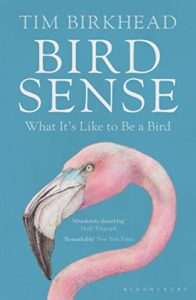 Dr Sally Westwood, RDA Member, writer and photographer particularly related to birds
Dr Sally Westwood, RDA Member, writer and photographer particularly related to birds
What sort of books do you normally enjoy reading?
“Particularly enjoy ornithology, world bird identification and photographic books, language books for learning Spanish and Portuguese and thrillers.”
Do you usually buy books, use the library, chose as part of a reading group?
“Usually purchase my books. Have recently converted to kindle edition, but still prefer the actual book to hold and read.”
Recommendation:
Bird Sense: What It’s Like to Be a Bird by Tim Birkhead (Bloomsbury, 2013)
“This book offers a fascinating insight into bird senses, and how and why birds possess their unique skills. The Loggerhead Shrike for example, has exceptional eyesight, and can see a Falon three minutes before we can. It can, therefore, escape predation from such a hunter. Birds also use their left and right sides of their brains for different tasks, which is coupled with the way they use their eyes and how they use their voice box. Mr. Birkhead tells how different birds have different strengths and weaknesses, which makes for most informative and engaging reading.” -
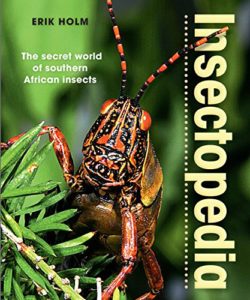 Dr. S. J. Perks, RDA member & writer
Dr. S. J. Perks, RDA member & writer
What sort of books do you normally enjoy reading?
“Enjoy any book on insects that is interesting and informative.”
Do you usually buy books, use the library, chose as part of a reading group?
“Usually buy them as either hard copies from Amazon or Kindle.”
Recommendation:
Insectopedia – The Secret World of Southern African Insects by Erik Holm (Penguin Random House, 2017)
“Absolutely the most instructive, straightforward, well-arranged book on insects out there. Do not be put off by the ‘African Insects’ bit, as many of these creatures also are found world-wide. Holm takes the reader through the life and world of insects, from their birth through their lives and how to identify the different types of insects. The illustrations are exemplary, the accompanying script is simple to follow and written in a fascinating manner. By dipping through this book one can accumulate many fascinating facts so as the very beautiful Jewel beetle being able to withstand temperatures of 60 o C; or the fact that some moths make baskets in which to deposit their eggs.” -
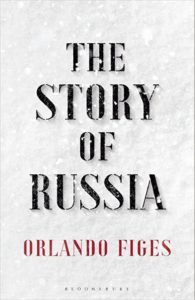 Nick Cottam, RDA member, author, journalist
Nick Cottam, RDA member, author, journalist
Describes his reading tastes as ‘eclectic’.
Recommendation:
The Story of Russia by Orlando Figes (Bloomsbury, 2022)
“Swap the Deben for the Dnieper and you can find a watery connection to The Story of Russia, the compelling new book by Orlando Figes which, aside from its historical gravitas, gave this reader some new insights into the current horrors of Ukraine. Figes, a highly respected academic historian, takes us back to the origins of the Rus people, gathering in part at least on the banks of the Dnieper and trading north to the axis which becomes Moscow and the heart of an emerging Russian empire. What a story. Invaded and pulverized by the Mongols, subjugated by divine Tsarist rule and then torn asunder by revolution we slowly come to modern Russia – and Putin. This is a book that will help you understand both the brutality and mysticism of the Russian people. Like Saxon Deben, the Dnieper had a part to play.” -
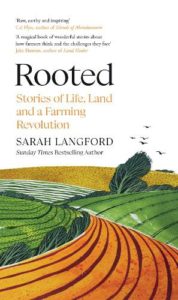 Catherine Larner, RDA member, freelance journalist, organiser of numerous author events in Woodbridge in association with Browsers Bookshop, and weekly book reviewer in an e-newsletter through her website moreaboutbooks.com
Catherine Larner, RDA member, freelance journalist, organiser of numerous author events in Woodbridge in association with Browsers Bookshop, and weekly book reviewer in an e-newsletter through her website moreaboutbooks.com
Recommendation:
Rooted by Sarah Langford (Viking, 2022)
“A former criminal defence barrister, Sarah Langford lives with her husband and two young sons near Debenham in Suffolk where the family is seeking to farm their land regeneratively.
Sarah looked into what other farmers were doing in East Anglia and elsewhere in the country. The conversations she had and the information she gathered led to her writing Rooted .
She discovered that a new generation of farmers were either selling up or deciding to do things completely differently. There is a big shift happening, she says.
The challenges of climate change, Brexit, falling incomes, accusations of ecological mismanagement, a hostile press and public – these issues and more are all addressed in a beautifully written personal response which is impossible to put down!
Many of the stories of the individual farmers she’s met are shocking and upsetting in all that they’ve experienced, and this is very much an account of the destruction of our land. But in her warm, honest and passionate response, Sarah leaves the reader feeling uplifted, energised and, ultimately, hopeful, not least because of the good people who are trying to make a difference. And she equips us and encourages us to play our part too.” - James Skellorn, RDA member
What sort of books do you normally enjoy reading?
“I enjoy all types of sailing books, but especially narratives and biographies.”
Do you usually buy them, use the library, chose as part of a reading group?
“I usually buy the books I read.”
Recommendations:-
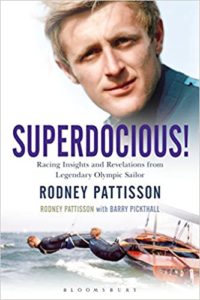 Superdocious! by Rodney Pattisson (Bloomsbury/Adlard Coles, 2019)
Superdocious! by Rodney Pattisson (Bloomsbury/Adlard Coles, 2019)
“I think the published price was £22, but there seem to be second hand copies about for £14 or so.”“Rodney Pattisson was our pre-eminent racing sailor in the late 1960’s and 1970’s, the equivalent of Ben Ainslie. His sailing started when he and his father built a cadet. He was a man who said little publicly about how he achieved success. He explains the fanatical attention to detail and physical fitness that were key elements to success, and there are some great stories, from the part his father played as a swordfish pilot in sinking the Bismarck , to attempts by foreign sailing officials to trick Rodney into being paid to compete at an event (which would have disqualified him from the Olympics under the rules at the time) to winning the Quarter Ton Cup despite an offshore race where the mast step of his boat disintegrated, and the mast tried to make its way out through the bottom of the boat..”
-
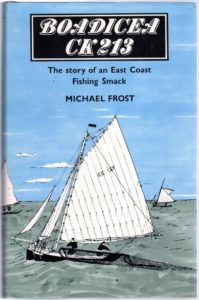 Boadicea CK213: The Story of an East Coast Fishing Smack by Michael Frost (Angus & Robertson, 1974)
Boadicea CK213: The Story of an East Coast Fishing Smack by Michael Frost (Angus & Robertson, 1974)
“Available second hand for as little as £4.”“Boadicea CK213 is a complete contrast: a delightful narrative describing the lives of oyster fishermen on the Blackwater and at West Mersea. Michael renovates Boadicea and gets her sailing again. He describes the ways of the smack sailors with great affection. My favourite bits include a section where he is watching the ‘company boats dredging for oysters and realises after a while that they are sailing in formation as they work: not because they need to, but just because they can. There is also a trip across the channel in Boadicea where he brings the chart up on deck at a crucial moment, only for the wind to catch it, snatch it from his grasp and blow away downwind to a watery fate. No longer in print, but beautifully written.”
-
-
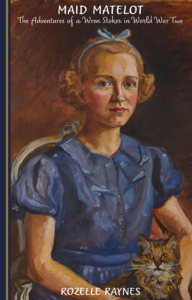 Claudia Myatt, RDA member, artist & musician
Claudia Myatt, RDA member, artist & musician
Recommendation:
Maid Matelot: The Adventures of a Wren Stoker in World War Two by Rozelle Raynes (Golden Duck, 2022)
“Books about World War II rarely appeal to me, but this one is a pure delight, a first hand account of the early life of a woman who found that the outbreak of war gave her the opportunity to reject the role society expected of her.
Born in 1925, Lady Frederica Rozelle Ridgway Pierrepont had her life mapped out – a series of coming out balls, social responsibilities then a suitable marriage. But from an early age shew knew this was not the life she wanted. The outbreak of World War II gave her the escape she craved, and at 17 she joined the WRNS. Desperate to be out on the water and not stuck behind a desk, she became a Wren stoker, working on the fleet of small boats servicing the navy ships at anchor in Southampton water. Her account, based on her teenage diaries, reflects the joy and purpose she finds in this hectic world, working in all weathers with recalcitrant engines and male banter. It’s frank, lively and at times very funny, but there is a thread of poetry too.
The contrast between Rozelle’s life in Southampton and her visits home is a reminder of how clearly defined a woman’s role was in those years – especially a woman born into the upper classes. She found the formal dances particularly trying:SP (suitable partner): ‘Are you going to the Cholmondley-Davenport’s ball next week?’
Me: ‘No, I’ve never heard of them and anyway I’ll be back at work next week.’
SP: (peering at my oil-engrained fingers with repulsion) ‘Work! Whatever sort of work do you find to do?’
Me: (standing on tiptoe to achieve an extra inch above my normal height) ‘I’m a stoker in the WRNS.’
SP: (unimpressed) ‘What a comic idea! Boats always make me vomit. What a relief it must be to come home on leave.’The end of the war left Rozelle and her Wren friends trying to find their way in a world which, though rapidly changing, had few opportunities for skilled and sea-loving women – I’d love to have met her, though at times, reading this book, I felt as though I already had.”
-
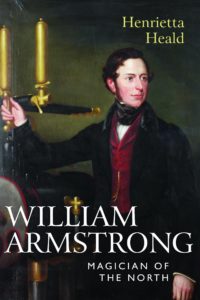 Maxine Reynolds, RDA member and Woodbridge Boatyard owner
Maxine Reynolds, RDA member and Woodbridge Boatyard owner
What sort of books do you normally enjoy reading?
“Travel books.”
Do you usually buy them?
“Yes. And I use Fondazione Querini Stampalia Library in Venice. This was founded in 1869 by Count Giovanni Querini – complete with his antiques, chairs, rugs – to be kept open until midnight seven days a week to enable working Venetians to read books when they finished work & other libraries were closed. I also use the Fellows Room Royal Geographical Society.”
Recommendation:
William Armstrong: Magician of the North by Henrietta Heald (Northumbria Press, 2010)
“William Armstrong was a forgotten genius, an engineer, industrialist, philanthropist and environmentalist of the Industrial Age. The special thing about this book for me it was to read it in his sad, hauntingly beautiful, dilapidated, neglected patrimony Jesmond Dene in Newcastle. This is the extraordinary site he created for his workers and gave to the City of Newcastle in 1883. The site and its buildings are currently being championed for regeneration by a heroic team of artists, writers and architects. I sat in sublime peace among exquisite nature and felt hugely replenished by this efforts of remarkable human being. Yes. He built machines for war. As a Quaker obviously I have an opinion on that.” - Sue Ryder Richardson, RDA Member and magazine walks contributor.
What sort of books do you normally enjoy reading? Do you usually buy books, use the library, chose as part of a reading group?
“Normally buy novels, historical fiction and occasional biography/autobiography. I belong to a book group in Sweffling.”
Recommendations:-
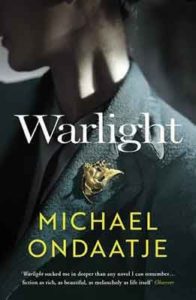 Warlight by Michael Ondaatje (Knopf, 2018)
Warlight by Michael Ondaatje (Knopf, 2018)
“It’s London in 1945. Two young teenagers, their parents having departed for the Far East, are left in the care of The Moth, an enigmatic man, with connections to a mysterious underworld in wartime London. A place peopled by a cast of characters which include the delightful ‘Darter’. Nathaniel, 14, takes the reader through a kaleidoscope of events which create a surreal world in which neither the reader nor the children have any grasp on reality. A family house in The Saints, near Bungay, Suffolk, bookend the story. It is here that you sense Nathaniel trying to understand his strange experience.”
-
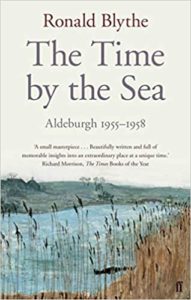 The Time by the Sea: Aldeburgh 1955-58 by Ronald Blythe (Faber and Faber, 2013)
The Time by the Sea: Aldeburgh 1955-58 by Ronald Blythe (Faber and Faber, 2013)
“A must for any East Anglian who loves the Sea, Aldeburgh, Britten, Music. It is the personal memories of a very particular time in Suffolk. Ronald Blythe’s vitality in telling of the people who worked and lived in this post-war idyll, complete with all its tales and digressions, is completely engaging. It has a feel of Seabald’s ‘Rings of Saturn’, another must for any East Anglian.”
-
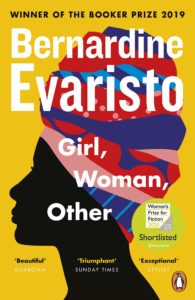 Girl, Woman, Other by Bernadine Evaristo (Hamish Hamilton, 2019)
Girl, Woman, Other by Bernadine Evaristo (Hamish Hamilton, 2019)
“This book tears the reader away from any preconceptions or prejudices. Evaristo’s world is woven from the lives of twelve very different women in twelve short stories. These vignettes interconnect women of different nationalities, colours, sexualities, whose lives have at times, mostly unwittingly, interacted. It is a book of enormous breadth and depth, one that challenges the reader. Humbling and brilliant.”
-
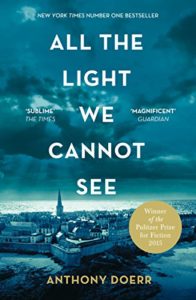 Robin Whittle, past chairman of the RDA
Robin Whittle, past chairman of the RDA
What sort of books do you normally enjoy reading?
“Enjoy reading a mixture of classical fiction, fiction (including thrillers), biographies, and auto biographies.”
Recommendation:
All the Light We Cannot See by Anthony Doerr (4th Estate, 2014)
“The extraordinary ability of a blind girl. The hideous activities of the Gestapo. The amazing quiet strength of the Bretons and how they managed to survive in spite of the brutal invasion of the Germans. The amazing life of a German orphan with the Hitler youth.”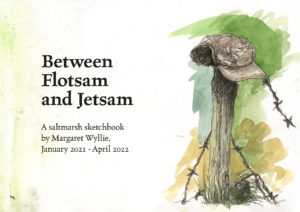 Simon Read, RDA member and Trustee Director for the Deben Estuary Partnership
Simon Read, RDA member and Trustee Director for the Deben Estuary Partnership
Recommendation:
Between Flotsam and Jetsam by Margaret Wyllie (Deben Soundings, 2022)
“This sketchbook was produced by Margaret Wyllie under the auspices of Deben Soundings, a research project to raise the level of community participation in landscape management.
It is a response to an open invitation to record change at a key location in the Deben Estuary over the lockdown period 2021-2022. Margaret Wyllie was one of 9 respondents who followed the project and who chose to chronicle the saltmarsh between Bawdsey and Ramsholt in exquisite detail.
As a response to the privations of Covid and to the limited horizons it imposed, this sketchbook is a rich conversation, through art with an unassuming tidal landscape and an example to us all to look harder and more caringly at our own immediate environment.”
